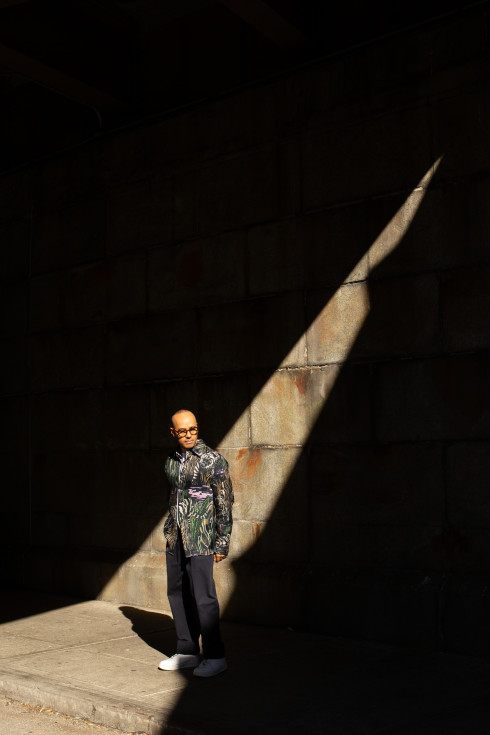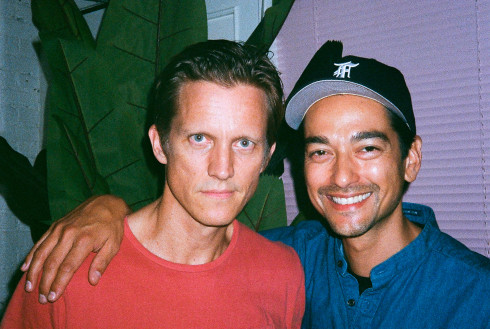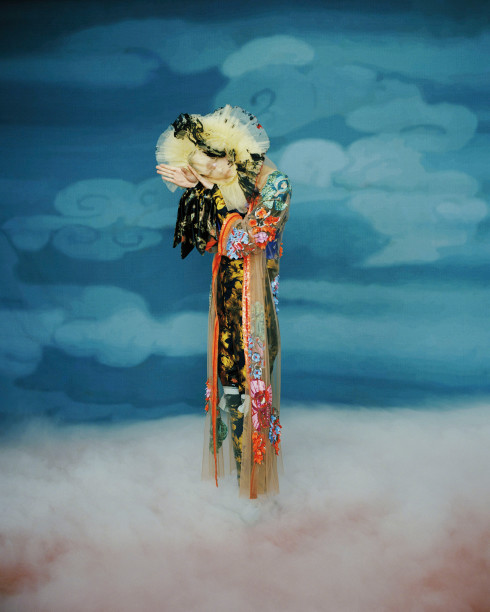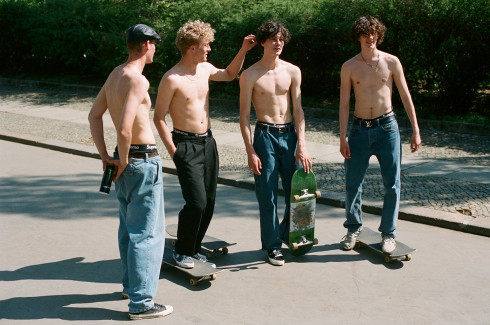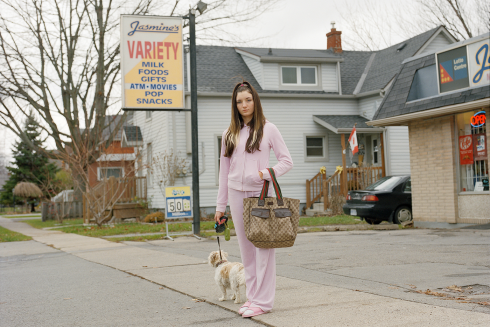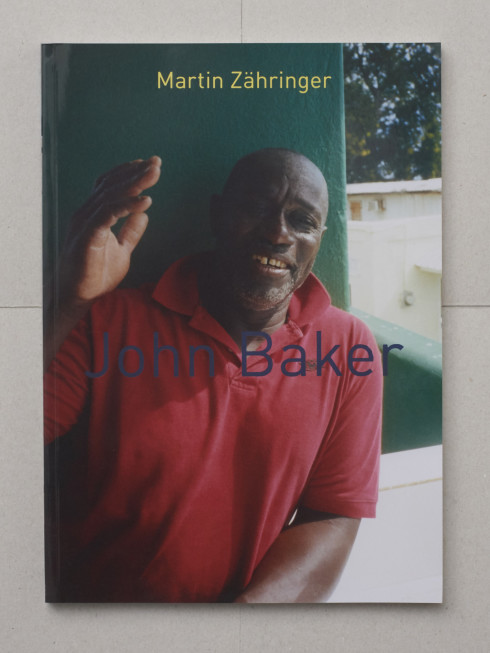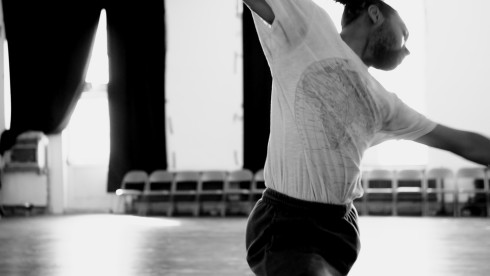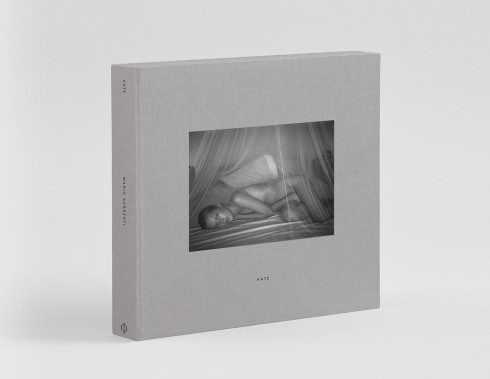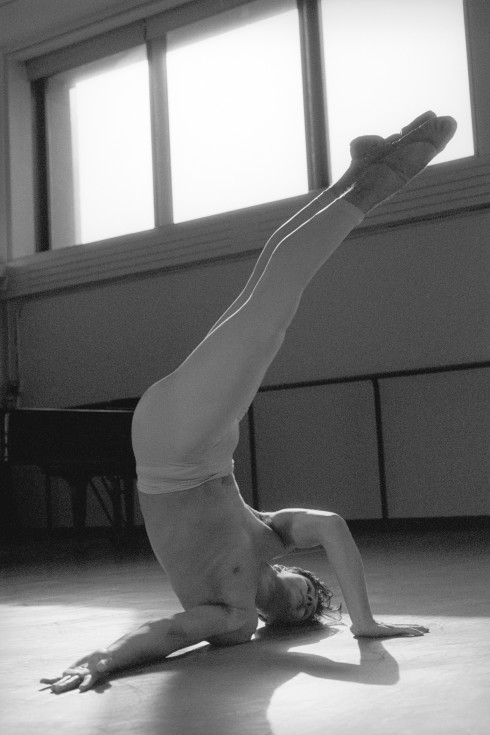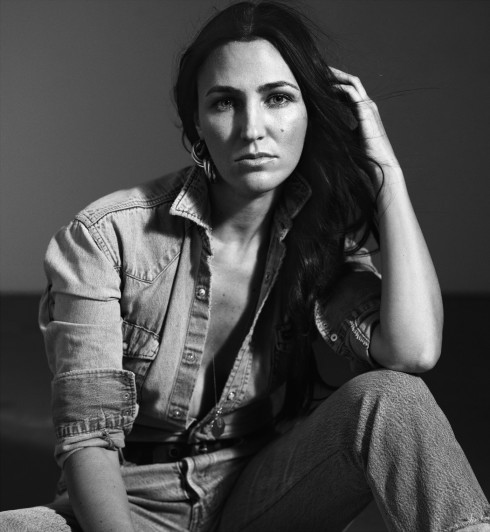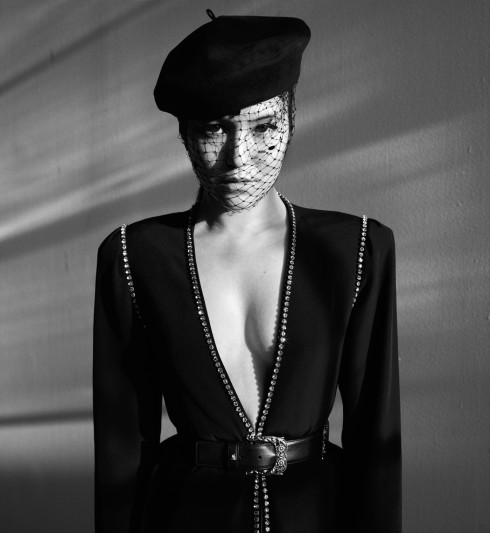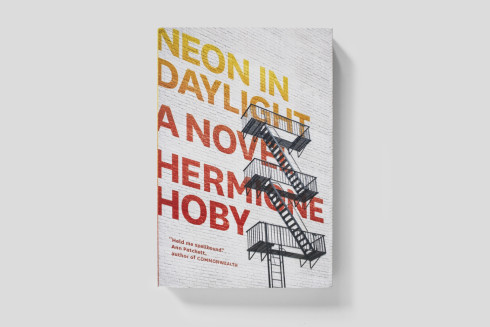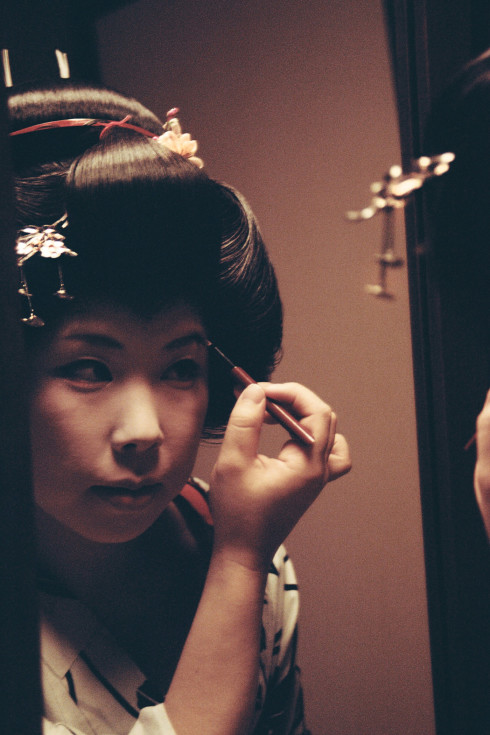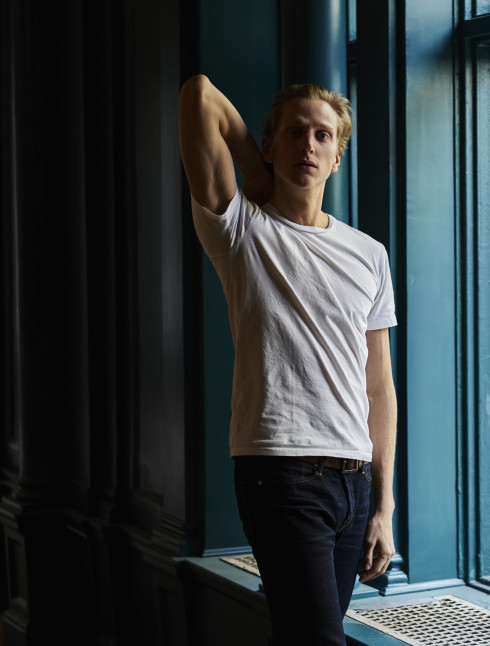
THE LAST WORD — SWARMAGEDDON
Spend some time this holiday weekend with “Swarmageddon,” a clear-eyed tale of forgiveness and redemption—or the lack thereof. Justin Tyler Keenan’s story is the latest edition of The Last Word, our ongoing series of original short fiction.
I was up at the gas station to buy some bags of ice on credit when I ran into a former colleague. I didn’t think he lived in my part of town, but there he was, wearing an expensive linen shirt unbuttoned to reveal black commas of chest hair, a six-pack of too-fancy beer in his hand. It was an awkward moment, because he and I had been friends before we had a falling out, and we hadn’t seen each other or spoken in months. Which made it strange, then, that he didn’t seem at all surprised to see me here. And even stranger, he had this wide, dopey smile when he saw me. I didn’t know what to say, so I said, “Good seeing you,” as though he were just leaving.
His smile grew even wider and dopier, if that were possible. “So things are good?” he said.
“I guess,” I said, both rattled and annoyed now. “Laura’s expecting.”
“I heard,” he said. Then he clapped me on the shoulder, his grin now defying the bounds of width and dopiness. “Congratulations. I’m really happy for you two.”
I nodded, smiling stupidly myself now. Meanwhile, my investment in ice was rapidly depreciating onto the linoleum floor.
It got awkward again once we got to the register and the cashier assumed we were together. He started to ring up the ice and beer together and I was about to say something, but my former colleague said, “I’ve got this,” and paid for us both. On the way out the door he waved and said, “See you later, Lon.”
“Later,” I said.
At home, I told Laura about the whole thing.
“Ran into Travis Dillard at the gas station,” I said, emptying the slimy remains of my investment into an orange cooler.
“Oh,” she said. “And how is he? How’s U of L?”
“Fine, I guess,” then, because it had been bothering me, “Did you know he lived in the Highlands?”
“Of course not.”
She went back to chopping vegetables. There were colorful chunks of bell pepper and onion and squash and little skulls of mushroom that kept rolling off the cutting board. Schop. Schop. After a moment, she said, “I always liked Travis.”
“He can be nice,” I conceded. Schop. “But he’s an idiot. Besides that, he had every advantage. You think he would have gotten an offer from U of L if his parents didn’t sit next to the Heyburns at football games?”
“I don’t know about that.”
Schop.
“Of course you don’t. You weren’t there.”
She set the knife down. “I love you, Lonnie, but you keep things on your heart too long,” she said.
“I don’t want to think about Travis Dillard anymore,” I said, and put it out of my mind. She came over and wrapped her arms around me. I took in her sweet, dewy scent—the morning, the vegetables, the little drops of perfume dabbed along the fleshy ridge of her collarbone. She guided my hand over her swollen belly.
“Easy,” she said. “Can you feel it?”
In truth, I couldn’t. Whatever was taking place in the dark wet machinery of her womb felt distant, even unrelated to me. Still, I’m smart enough to know when to lie.
“Yes,” I said.
The window was open and the breeze was being sieved through the wire screen. Something—maybe it was the weather or believing we were both feeling this lump of life moving around inside her or maybe just the fact that it was Sunday—had got her in an especially Christian mood, because just then she started cooing an old Sunday-School song: “Surely goodness and mercy will follow me all of my day-ay-ays.”
—
The party had been her idea. It struck me as a strange weekend for a party: the thirteen-year cicadas had recently emerged and most sensible people were still avoiding unnecessary trips outdoors. But I didn’t protest. I’d found that it was generally easier to just let her have her way. Laura was normally an extremely demure, practical woman, but sometimes an idea would seize her mind and carry it to great lengths in unusual directions, like she was absolutely going to die if we didn’t have a cookout to celebrate the cicada emergence, the first of our adulthoods.
She kept repeating the last part as though it explained everything.
Besides that, she was about eighteen weeks along and keen to show off during that window where she looked pregnant and attractive at the same time, and I suppose I liked the thought of showing her off, too. In those days she had a sheen on her that I found intoxicating, an admixture of the natural glow that accompanies one in the slow act of creation and the inevitable gritty film that summer brings. On her skin the grit flashed like glass on the roadway.
Despite everything, I sometimes felt a stirring of pleasure at having impregnated such a woman.
She called the Facebook event Swarmageddon, a name I’m pretty sure she lifted from a segment on the local news. She also made pictures to go along with it in MS Paint, cropping pictures of tiny party hats and Solo cups and pasting them onto a seething mass of the things. I refused to use Facebook, so she handled all the invites. She asked if there was anyone I wanted there, knowing full well there wasn’t. Even after living in Louisville nearly two years, it remained her home, her friends.
The period between the end of spring and the honest onset of summer had its own queer kind of beauty, the brittle grass radiating the earth’s warmth and the light making the under- sides of the leaves glow like a warning, the humidity not quite so bad as to turn your sex-having parts to swamp matter. Those days would come soon enough, I knew.
Laura would have said that it was one of those days when anything felt possible. But possibilities have a way of getting waylaid in the Ohio Valley, and in Kentucky, in the summer, the air is so thick with them that you can lay yourself out and feel them flow right over and through you, their tired refrain yawning in the trees: Guess this’ll work / For now.
—
Laura had gotten pregnant almost immediately. I was stunned when she told me. That might have, should have, been it. She even came to me in tears, saying, “That’s it, right? I can tell you don’t want to stay,” but just to prove her wrong, I said, “No way. This is the greatest thing that could have happened to us.”
For six months I’d been thinking about how to re-spool my life after that singular act of obstinacy. I prayed for layoffs, worse. Instead, the community college asked me to come on fulltime, offered me benefits. Despite every effort, I was becoming rooted to this place.
—
A while later I was out in the yard, scrubbing down the grill with a wad of steel wool. All around, the cicadas sang songs to each other in their infernal tymbal language. It stirred thoughts of living by the ocean. Their sound filled up the whole air, so that I didn’t hear the footsteps in the grass until they were right upon me.
I looked up.
“Travis.”
“Howdy, Lon. Know I’m early but I don’t know anyplace to hang out in the Highlands.” He was still carrying the six-pack of too-fancy beer.
“Here,” I said, and shoved the blue-foaming wad into his outstretched hand. I went up the back steps into the kitchen where Laura was easing the chunked vegetables onto skewers, and demanded an explanation.
“Jesus, Lonnie,” she said. “I’m sorry. I must have clicked his name on accident.”
“Some accident!”
“Just relax. Let it go,” she said. She had one hand on her stomach and the other on my arm. “Babies can feel negative energy. It can cause complications.”
“Travis Dillard is negative energy! Travis Dillard is a complication!”
“Lonnie.”
“You invited him, so you entertain him,” I said, and stamped off to shower and change. From the shower I could hear her giving him the grand tour, tramping through the future baby’s room, my soon-to-be-former office, tracing invisible furniture with her hand. When I came out, the two of them were chat- ting and laughing around the kitchen like old friends, him with a beer, her with a glass of Lipton iced tea. I walked right past them and started pulling folding chairs out of the closet.
The other guests started to arrive. Before I knew it, there were a half-dozen of Laura’s friends in the backyard, standing around waiting for there to be a party, or at least grillables. With Laura they fell easily into decade-old routines. They’d all known each other since elementary school, a situation that was far more typical here than in other places, I found. It was something I could never apprehend, all the subtle tanglings of personal history that made up every interaction. I found her friends simultaneously overwhelming and boring, and believed they resented me, the Yankee interloper who’d come in and dynamited their social order.
As soon as I could, I pulled out two of the folding chairs, leaned back, and propped my feet up, intending to wait this one out.
There was one woman in her mid-twenties who eased onto her haunches and stroked a chocolate Lab. She was a barista at the coffeehouse up the road, a friend of a friend of Laura’s. In her simple cotton dress she was the kind of vision that could keep a depressed man alive through winter. My former coworker was trying to chat her up, but she seemed more interested in the dog, who for her part was more interested in the cicadas that periodically drifted past her muzzle. From the back steps, our old, tinny boombox leaked some tunes into the yard. Leaning against the house, two lawn chairs awaited the butts that would make them whole. One guy was bent over laughing at a story someone was trying to tell but couldn’t finish because he too was laughing. One of them wiped away a tear, his shoulders still jerking. Because of the cicadas, everyone was talking louder than normal, basically shouting at each other.
Maybe the strangest thing: there was one guy walking around in a full-body cicada costume and some other guys who were trying to decide if it was Jeff, because who else but Jeff would have both the wherewithal to buy and/or assemble a credible cicada costume for a cookout and also the dearth of social awareness to keep it on way after the joke—if you could call it that—had expired. More absurd yet: the creature who may or may not have been Jeff wore, strapped diagonal across its abdomen, a bandoleer loaded with beer cans. Every few minutes someone would come by, slide one from its place, and pat the thing on the shoulder or flash a thumbs up, and later someone else would come by with fresh cans and reload it.
I found the whole scene insufferable.
Drinks were drunk. Eventually, two guys found their way
into an old storage bin that had been there since we moved in. They pulled out all manner of antique lawn-game equipage and, for some reason, a pair of wobbly fencing swords. They started going at it, each trying to drink a beer with one hand while thrusting and parrying with the other. I recognized one, a guy we’d gone to college with. He was a nice guy, but not very bright. I hadn’t realized that he and Laura knew one another, or that they’d stayed in touch during the intervening years.
A round of burgers was passed out and I got in line with everyone else, nodding along like a polite but disinterested stranger to whatever was being said. Two guys in line were reminiscing about what they’d been doing thirteen years ago, when this brood of cicadas was just settling into the earth for its prolonged gestation.
“Killing it at YMCA soccer.”
“I forget you did that. Why wasn’t I there? Where was I?”
“Playing Starcraft, no doubt.”
A response which, inexplicably, earned a high-five. A hockey puck of burger landed on my flimsy paper plate. “For the man of the house.”
“What about you, Lon? Where were you?” “Far away from here.”
For my part, I wished buried things would stay buried.
—
Other people gradually trickled in, bearing hot dogs and blue-corn chips and more beer. It slowly dawned on me that this was the first time we’d had a party at this place since Laura’s ex moved out and I moved in. Most of these people I hadn’t seen in months. At the time I thought it was just that the pregnancy had been hard on Laura. She was the first in her group to go through it, and I assumed her friends weren’t anxious to wheel a bloated pregnant woman around. But here they all were, people whose names I could not begin to guess, pumping my hand and slapping me on my arm like we’d been friends for years and years.
Then, out of the corner of my eye, I saw Laura’s father. He was hugging and chatting with Laura’s friends, and they smiled and deferred to him the way you did to someone you’d feared as a kid but had since come to appreciate. Theirs was an earned ease I would never have with that man. He and I had not spoken since we got into a fight at Easter dinner. He had just given the blessing and asked me what I thought of it, and I’d proposed that if Jesus died for our sins then the more people who were born and kept on sinning the less suffering and therefore less redemption there was to go around, a theory of grace that did not comport with the old man’s understanding. But here he was, standing in my yard, holding a basket of fruit still wrapped in plastic from Kroger. I pulled Laura away from her friends.
“Did you accidentally invite him, too?”
“He’s my father, Lonnie,” she said.
“Christ,” I said.
“Longinus,” her father said, squeezing my forearm. “It does an old man good to see you two happy and healthy. You three, I should say.”
“Glad you could make it,” I lied. Then he reached in and gave me a long, nondenominational hug.
“The gang’s all here,” Laura said.
“Well, not quite the gang I remember,” her father said. Immediately the quality of the air between the three of us changed. I couldn’t tell if the old man had done it on purpose or not. Finally he said, “Shame things fell out the way they did,” he said, then added pointedly, “He was a good man.”
I shrugged. “Well, all’s well that ends well, right?” I said.
For her part, Laura had suddenly become very interested in the space between her feet. As soon as I could, I detached myself and found the guy in the cicada costume, took a warmish beer from his bandoleer, and quickly unloaded it. Then I did it again.
“Wish I were in there instead,” I said to the guy who may or may not have been Jeff, whoever Jeff was. He shrugged, conveying about as much emotion as was possible given the situation. Laura came up to me.
“Easy,” Laura said.
“Easy for you,” I said.
—
Laura had tried to remain friends with her ex, but it hadn’t worked out. Sometimes it doesn’t. You can’t be shy about cutting out a tumor. Not that Laura saw it that way. She would go on and on about what a good man he was. That was the general consensus, it seemed, and it drove me up a wall. The longer she stayed with me, the more fantastical his retrospective goodness became.
Once I asked her if I was a good man, too, just to see what she’d say.
“I chose you, Lonnie,” was her response.
I didn’t pity him. He fled to Japan not long after everything that happened, to teach English and perform other sundry acts of magnanimity. I hated that he got to do exactly what I wanted, and wished every kind of disaster on him: for his plane to fall into the ocean, for a tsunami to drop a boat onto his house, for Mothra to melt his high-speed train with its heat vision, for a deranged Harajuku girl to strike him down with a morning star. I wanted the earth to open up and swallow whole this man I’d wronged. The hate in my heart for him was hard and perfect as a diamond. It was our engagement ring. It would have been a shame to adulterate it.
Even now people kept arriving: a former roommate, servers I’d been rude to, two girls I’d been sleeping with simultaneously at one point, both laughing and splitting a burger, each complimenting the other on how great she looked. The entire awful town was in my backyard. All things that had been buried had returned to the surface. My blood turned to ice water. I wanted to run inside and pack just then, drive, leaving Laura and her friends and the unborn child I felt no affinity for.
“What the hell is going on?”
“I love you, Lonnie, but I need you to make peace. You act like it doesn’t affect you but I see it every day.”
“Christ, Laura,” I said. Then, absentmindedly, “At least he’s not here.”
Again, the thing between her shoes. Her tell. “Is he here?” I asked.
Nothing.
“Where?”
Her lips didn’t move but her eyes said everything. From fifteen feet away, the man in the cicada costume regarded me with red Styrofoam eyes. I crossed the yard, snatched a rapier from the guys in the yard.
“He’s a good man!” Laura called.
“See how good he is when I’ve tied his dick in a bow!”
I whacked my blade against my opponent’s carapace and sent bits of plastic flying. He turned as if to shield himself but I kept at him. I tore a wing, bent an antenna, but the tip of my blade could find no purchase. Eventually someone slipped him a croquet mallet, which handily deflected my clumsy attacks. There were people yelling for us to stop, of course, others cheering us on, but not a soul moved to intercede. The woman in the cotton sundress was so drunk that she kept laughing, thinking it merely the latest stage in an act that had lost none of its novelty.
We banged on each other for a long while, I impeded by my drunkenness and he by his ridiculous costume. I misjudged, lunged too far, and my opponent got the head of the croquet mallet behind my foot. He swept me easily on my back. I looked up, saw only dull Kentucky sky and my enemy’s impassive red eyes. I put the tip of my blade through one of them, wishing it would burst like an overripe tomato, but the Styrofoam made only a weak crunching sound.
I turned to Laura and smiled but her face was blurred and illegible.
The cicada set the mallet in the grass and extended his hand to me. In response, I thrust again. This time, the tip of my blade pierced his abdomen.
“Better man lost!” I crowed.
Laura yelped. My foe listed as though suddenly drunk and collapsed on top of me. The black lab ran over and started licking my face.
A few people rushed over and rolled him off me. They struggled but couldn’t figure out how to get the head off the costume. People pointed and shouted. Laura’s father appeared with a pair of garden shears to split the carapace down the belly. Meanwhile, a trickle of cheap, foamy beer issued from his side, and the dog started lapping at it, too. Finally, I got tired of watching them fumble with it. I waved them aside with the sword, squatted over him, gave the head a quarter turn, and pulled.
I knew exactly what awaited me, and still I did it. There was clunk, a slight whooshing of overheated air.
The face of the man whose life I’d more or less stolen was drained of color and greased with sweat, his breathing slow and deliberate. For some reason he reminded me of a fish resigned to death on the shore. Then, as if drawing from his last reservoir of strength, his eyes grabbed hold of mine.
“Christ,” I said.
“You’re forgiven,” he pronounced, and immediately passed out. Laura appeared at his side with a rag of ice from the cooler
and held it against his neck. His face now shinted with a strange contentment, like a newborn asleep after its first day on earth.
“What is this?” I said.
“It’s exactly what it looks like,” she said. Her voice was flat and even. It was a new voice and it shook me. A few people clapped politely, as though they had just witnessed an expert chip shot directly onto the green. “Good man,” they muttered. From the back, someone said, “Wait, so where’s Jeff?”
I couldn’t handle it. My sword arm was still shaking. I got a tic in the side of my cheek. My blood was roaring and I wanted to cut a slit in the air and slip through. Finally, Travis Dillard put his hand on my shoulder and said, “Come on, Lon. Let’s go,” but something kept my feet fixed to the ground. In the trees, the cicadas screamed to one another, their diffuse chitter filling the whole of creation.
Farther still, an ambulance hastened to our location. Everyone kept saying what a good man he was. I wanted to tell them my hate was the crucible in which his goodness was perfected, that they should let me jump the turnstile into heaven, but it wouldn’t be any use. Soon, the ambulance would arrive. My enemy would get a tetanus shot and recover and press no charges, and I would receive no punishment beyond the awful knowledge that his forgiveness would follow me to the ends of the earth.
Justin Tyler Keenan is a writer from Louisville, Kentucky. Follow him on Twitter @mrjustinkeenan.
